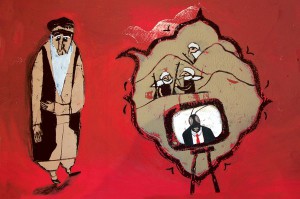
US “death squad envoy” arrives in Egypt – and the slaughter begins
My new Press TV article, published Monday, is looking prophetic – or as we Muslims prefer to say “precognitive.”
When the US sends a “death squad ambassador” to Egypt, you can figure that the big slaughter is about to begin. As of today, it has begun. Just as I predicted, the mass slaughter of Morsi/democracy supporters was triggered by false-flag terror.
Yahoo News reports: “Live (Egyptian) television footage on several channels appeared to show hooded Brotherhood (sic) gunmen brandishing what appeared to be small automatic rifles and firing them in the direction of soldiers.”
In fact, the “hooded gunmen” – like those who set off the Sunni-Shia violence in Iraq in Iraq and Syria – are professional killers working for the Empire and its current Egyptian stooge, el-Sisi. The purpose: To demonize Islam, destroy democracy, and perpetrate a genocide in Egypt.
-KB
Is the US government targeting Egypt for destabilization – and eventual destruction?
The recent appointment of death squad organizer Robert Ford as US Ambassador to Egypt suggests as much.
Ford’s appointment sends a clear message: US policymakers want to destroy Egypt in the same way they have destroyed Iraq and Syria – by using death squads and false-flag terror to incite civil war.








